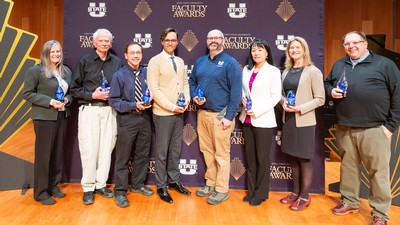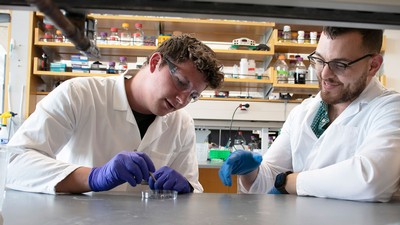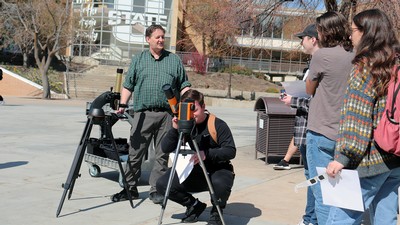USU Professors Contribute to Water Project on Tribal Lands
Kynda Curtis is one of two professors in USU's Department of Applied Economics participating in a five-year program to help Great Basin and Southwestern tribal communities develop plans and practices for sustainable agriculture and water management.
Utah State University’s Eric Edwards and Kynda Curtis, both professors in the Department of Applied Economics, will participate in a five-year program to help Great Basin and Southwestern tribal communities develop plans and practices for sustainable agriculture and water management.
Beginning July 1, faculty and students from the University of Nevada, Reno, Utah State University, the University of Arizona and Ohio University, along with the First American (1994) Land-Grant Consortium (FALCON); Desert Research Institute; and the U.S. Geological Survey, will integrate research and Extension to address potential water issues.
“The purpose is to work with the organizations on the reservations to understand the potential threats or changes that could be occurring under climate change specific to those areas,” Edwards said. “We want a collaborative approach that builds capacity within their reservation to manage their water in effective and efficient ways.”
This project, Native Waters on Arid Lands, is funded by a competitive, $4.5 million grant awarded by the U.S. Department of Agriculture’s National Institute of Food and Agriculture. The grant will provide the means to assess the effects of Indian land tenure on water management and agriculture, integrate paleoecological data with tribal knowledge to understand the impacts of a changing climate, test the efficiency of water systems, and more.
American Indian farmers and ranchers provide an important economic base for these arid lands. Declining water supplies, urbanization, ecosystem change and federal Indian policies challenge American Indian agriculture for ceremonial practices, sustenance and trade.
Edwards looks forward to extending his prior work studying water rights to understanding how land and water ownership structure affects decisions on irrigation and water efficiency. He hopes this will be a collective effort that helps predict the effects of climate change and develops the tools needed for adaptation.
Curtis will devote her efforts to examining economically efficient water systems, profitable low water-use crops, and producer adoption issues. Additionally, she will be involved in Extension activities, such as conducting focus groups and presenting study results to people in the study areas. Curtis has worked with tribal members in the past, but never with a focus on water.
Many reservations have little or no water access, Curtis said. Efficient and productive agriculture depends on the cultivation of low water-use crops and efficient water delivery systems.
“Agriculture is a large user of water, so there is a sentiment that agriculture should also do more to conserve water,” Curtis says. “This project will be important for tribal economic growth to implement water saving measures especially for tribes that rely heavily on agriculture.”
Relates links:
USU Department of Applied Economics
USU College of Agriculture and Applied Sciences
Contact: Kynda Curtis, (435) 797-0444; Kynda.Curtis@usu.edu; Eric Edwards, (435) 797-0915, Eric.Edwards@usu.edu
Writer: Cassidy Woolsey, Cassidy.Woolsey@usu.edu
Eric Edwards said the purpose is to work with organizations on the reservations to understand the potential threats or changes that could be occurring under climate change specific to those areas.
TOPICS
Community 444stories Utah 371stories Statewide Campuses 342stories Water 258stories Agriculture 225stories Sustainability 145stories Land-Grant 112stories Economy 48stories Rural Development 43storiesComments and questions regarding this article may be directed to the contact person listed on this page.








